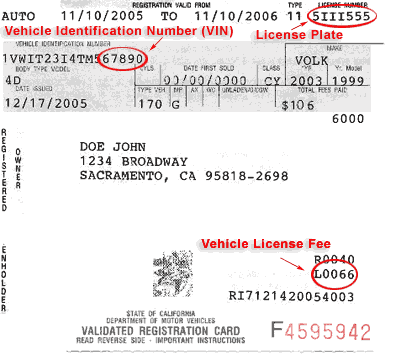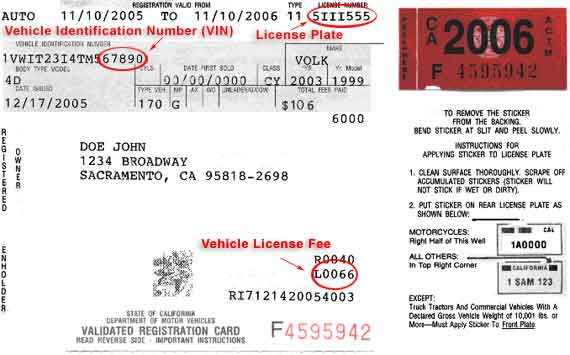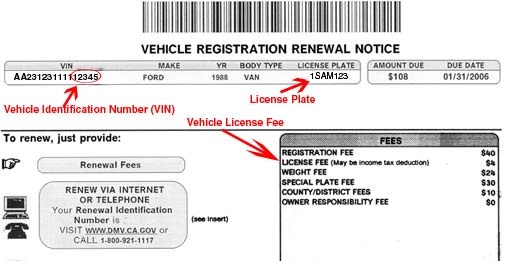This online service allows customers to calculate estimates of various registration and licensing fees.
Frequently Asked Questions
General Calculator FAQs
Fees vary depending on your actual vehicle registration transaction. For example, if the purchase price keyed by the customer differs from what is ultimately entered on the title and submitted to DMV, the vehicle registration fees may change when the vehicle is registered.
This system can only determine fees for basic transactions. For transactions that require a more complex calculation of fees (planned non-operation, partial year registration, private school bus, and permanent fleet registration, etc.), you may call DMV at 1-800-777-0133 between 8 a.m. and 5 p.m. Monday through Friday.
New Vehicle Calculator FAQs
No. The fees are based on the purchase price of the vehicle.
Normally, the dealer submits the fees to DMV for you.
Usually within 30-45 days of purchasing your vehicle.
The permit the dealer provides for display on the passenger side of the front window is valid until the plates and stickers are received by the customer, or for six months from the sale date, whichever comes first.
You must have liability insurance covering damage to the person or property of others. Comprehensive or collision coverage is for damage to your vehicle only, and does not meet the financial responsibility requirement. Check your policy or talk to your agent or broker to be sure that you have the correct liability insurance coverage. The minimum liability insurance coverage required for private passenger vehicles per accident is $35,000 and is defined by the following levels of coverage:
- $15,000 for injury/death to one person.
- $30,000 for injury/death to more than one person.
- $5,000 for damage to property.
Dealers may charge buyers a document preparation service fee not to exceed $65 (or $80 if a Business Partner Automation (BPA) program participant). This fee is not required or collected by DMV.
Nonresident Vehicle FAQs
The market value of the vehicle is based on the cost price to the purchaser as evidenced by a certificate of cost, bill of sale, titling document, or Kelley Blue Book. The market value includes any trade in or down payment amount but does not include the taxes.
Bring your vehicle to a DMV office for verification of the vehicle’s identification number (VIN). For your convenience, we recommend that you schedule an appointment.
Military personnel stationed in California are exempt from payment of the vehicle license fee (VLF) on any vehicle owned or leased and registered in California provided:
- The nonresident military owner is shown as a lessee or registered owner of the vehicle.
- The vehicle is not operated “for hire.”
In order to obtain the VLF exemption, military personnel must complete a Nonresident Military Exemption Statement (REG 5045) (PDF) form and NATO members are required to complete a North Atlantic Treaty Organization (NATO) Status of Forces Agreement (REG 5046) (PDF) form.
Note The duty station must be located in California in order to receive a VLF exemption.
More vehicle information for military personnel stationed in California.
Nonresident vehicle owners who move to California must register their out-of-state vehicles in California within 20 days of the date they accept employment or establish residency in California. Late registration fees are subject to penalties.
- Your tax consultant
- Franchise Tax Board 1-800-338-0505 or www.ftb.ca.gov
- Internal Revenue Service 1-800-829-1040 or www.IRS.gov
VLF for Tax Purposes FAQs
The Vehicle License Fee (VLF) is the portion of your registration fee that is tax deductible. VLF for Tax Purposes may assist you in determining the VLF paid in a specified tax year.
For the purpose of this transaction, the calendar year 1/1/XX through 12/31/XX is the same as a tax year.
You may retrieve the current year plus the two prior years. The tax years available are displayed in the tax year drop down box on the VLF for Tax Purposes inquiry screen.
No. The transaction will display only the VLF paid, based on the information provided.
It is the date that DMV completed a transaction.
You will need the following information:
- The vehicle license plate number
- Maximum of eight characters
- No spaces or symbols (e.g. star, hand, heart, plus)
- Alpha and numeric characters only
- Enter the license plate number that was assigned to the vehicle at the time the VLF was paid
- The last five characters of the vehicle identification number (VIN)
- The tax year in which the VLF was paid

It is the VLF portion of the fees paid on the processing date listed. Only the VLF paid is deductible for tax purposes.
It is the prorated amount of the VLF portion of the registration fees, which is refunded when a vehicle is salvaged or is stolen and unrecovered for at least 60 days.
Your annual vehicle registration payment consists of various fees that apply to your vehicle. The Vehicle License Fee is the portion that may be an income tax deduction and is what is displayed. Your renewal notice and registration card itemize these fees in the following categories:
- Registration Fee
- Vehicle License Fee (may be an income tax deduction)
- Weight Fee
- Special Plate Fee
- County/District Fees
- Owner Responsibility Fee
If the VLF paid does not display, select the next tax year. Even though it is displayed in the next year, it is deductible in the year that it was paid.
There may be some instances where DMV is unable to provide you with VLF payment information. For example:
- You may not have completed your transaction
- You may not have selected the correct tax year
- You may have paid in late December and DMV did not process your payment until the following year (see previous question).
- You may not have paid any VLF in the tax year selected


Fees may have been paid over multiple years, but the transaction may not have been completed until the “DMV Processing Date” shown. Please contact your tax consultant (see below).
Unless the dishonored check has been reimbursed to DMV, the VLF shown cannot be used for tax purposes.
- Your tax consultant
- Franchise Tax Board 1-800-338-0505 or www.ftb.ca.gov
- Internal Revenue Service 1-800-829-1040 or www.IRS.gov
Renewal FAQs
No. Outstanding parking/toll citation fees on the vehicle record at the time the renewal is processed will be charged in addition to the fees displayed on this transaction.
The CVRA weight fee is calculated using the weight currently on the vehicle record. If you are declaring a higher/lower CVRA weight, visit Registration Fees to calculate an estimate of the correct CVRA weight fee.
Make sure that you enter your new county and zip code in the Home Address Information so that the fees calculated will be based on those due for your new address.
It is important that you change your address on any other vehicles that you own and for your driver license.
Yes. If a Special Interest License Plate is currently assigned to the vehicle, the cost of the plate renewal is included in the displayed fees. However, if the transaction is a transfer of ownership, the plate fees will not display.
Change of Ownership FAQs
This transaction generates all registration fees due; use tax is all that will be due if you qualify for an exemption from registration fees.
You may deduct the VLF from the total fees due on or after your transfer date, for an estimate of fees that will be due.
This transaction only calculates the fee for one transfer. For an estimate of the fees due, add one transfer fee for each buyer in between you and the registered owner listed on the front of the title.
Yes. The use tax is paid to the dealer at the time of purchase.
This transaction will calculate the fees to provide you with a regular license plate.
The weight fee is calculated using the weight currently on the vehicle record. If you are declaring a higher/lower weight, use the weight chart to help you calculate the correct weight fee.
This transaction only calculates full year registration fees. The Fast Facts brochure Reporting Vehicle Status (Registered vs. Non-Operational) provides information and instructions for adding or retaining non-operational status to a vehicle.
This transaction generates renewal fees 75 days before the expiration date. It is optional to pay them 75 to 31 days prior to the expiration date; however, they must be paid when a transfer is completed within 30 days prior to the expiration date.
The vehicle registration has expired and this transaction displays all fees and penalties due.

